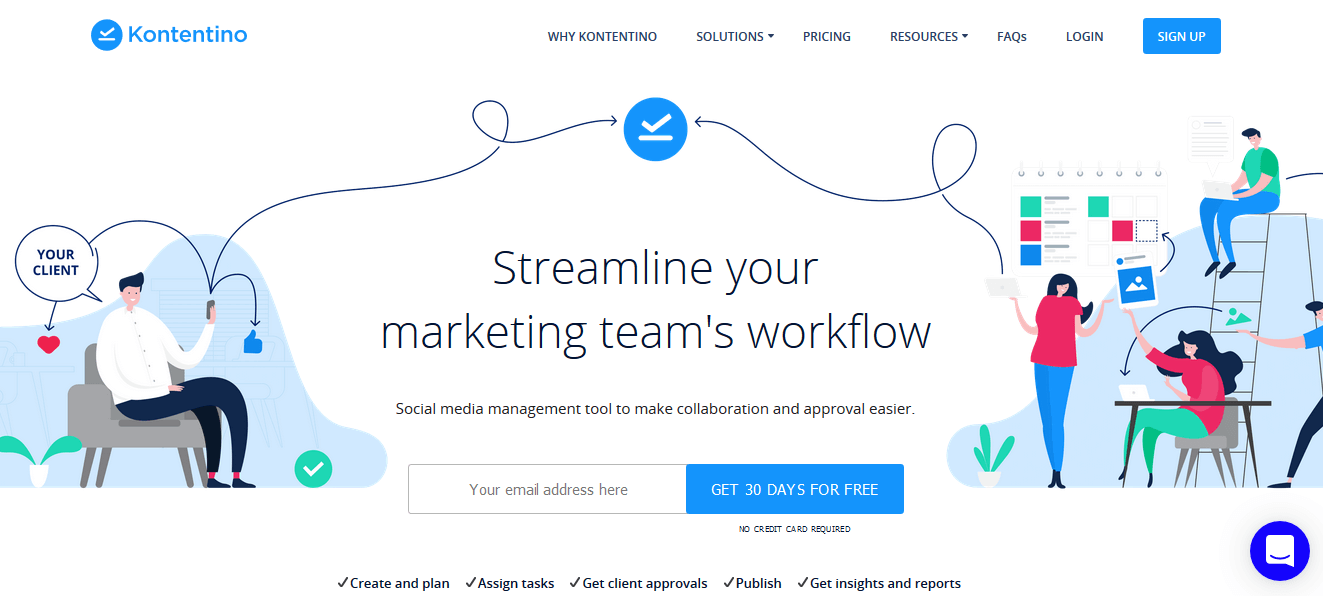Want to make sure your social media marketing agency works smoothly?
Here’s a tip for you:
Have a structured social media approval process in place.
Regardless of the size of your agency, approval is important. With proper processes in place, you can ensure that your agency can function like a well-oiled machine.
A well-thought-out social media approval process can ensure that it’s easy for your team to collaborate and function efficiently.
However, it’s all easier said than done.
Before we get into the details, let’s take a closer look at the basics.
Table of Contents
Social Media Approval Process: Which Are the Common Mistakes?
Let’s get this straight — You need to invest time into charting out a clear social media approval process. If you come up with a shoddy plan, you’ll probably end up wasting your resources and time.
So, what should you do?
It’s a good idea to take a look at your competitors’ strategies and see what works for them. More importantly, try to learn from their mistakes.
Want to come up with a great social media approval process?
Here are some common mistakes that you should avoid:
- Not having a plan of action
- Not defining clear roles and responsibilities
- Not setting goals for your team
- Not following a social media content schedule
- Not giving constructive feedback
- Getting stuck in back-and-forth email loops
- Not reviewing social media content before publication
Pro Tip: Don’t rush. Take your time to learn how you can optimize your resources.
5 Tips to Help You Plan An Effective Social Media Approval Process For Your Agency
By now, you know what your social media marketing agency shouldn’t do. Let’s move on to the next step and take a look at what you should do.
Here are some tips to help you plan a smooth social media approval process:
1. Create a Guidelines Document
Creating a guidelines document is the first step to developing an effective social media approval process. This document should be easily accessible by your entire social media team. It should list all of your social media content requirements, submission processes, and more.
Of course, you may have to tweak the guidelines as and when required. Keeping your guidelines document updated can ensure that everyone on the team is on the same page.
Plus, it can clear up any questions that your team may have while working on a project. Additionally, it can be an asset to simplify your onboarding process.
Not sure what to include in your guidelines document?
Here are some of the things you should consider:
- Length of posts
- Reporting structure
- Deadlines
- Response time
- Content tone
- Graphic requirements
- Brand guidelines
2. Leverage Social Media Management Tools
Effective planning and clarity are at the core of developing a smooth social media approval process. You need to have an editorial calendar to manage your clients’ campaigns effectively.
Sure, there is a lot that your social media marketing agency needs to get done.
Planning the content schedule, assigning tasks, creating social media content, sending it for approval, and more — it can all be overwhelming.
Thankfully, there are a lot of social media management tools that you can leverage for collaboration and publishing. Some of these tools also have options to help you manage your clients easily.
Take, for instance, Kontentino, a social media tool tailored to help marketing agencies streamline their social media workflows. This tool lets you assign multiple tasks at once, send them for internal or client approval, and track every single change with ease.
There’s no need to have endless Slack/WhatsApp communication with your team and get lost in email loops anymore.
With Kontentino, you have everything in one place. What’s more, they also get their live desktop and mobile preview feature. This makes it easy for you and your clients/managers to perfectly visualize all the posts, Facebook ads, and IGTV content.
In addition to this, it enables you to give social media approval through your mobile phone. Clients can also receive updates via email and mobile phone. Not only can they approve your posts, but they can also add comments or send your files back for rework easily.
You can also get valuable insights about your social media strategy performance, based on benchmarks and metrics you choose. Kontentino makes it easy to create customizable reports with just a few clicks.
You can check out all of the features related to planning and collaboration here.
3. Set Clear Expectations
The tasks that you assign to your social media team should set the expectations right. They should clearly list what is expected from each team member. If there are any special brand guidelines, it’s also necessary to mention them for clarity.
That’s all about your team communication and collaboration.
But how do you manage your clients?
The same holds true for client communication as well. Before you begin working on a project, it’s important for both parties to be on the same page. To avoid any confusion or disputes later on, it’s a good idea to list the deliverables along with the time frames for your social media content.
Need help outlining deliverables?
Aim for a detailed collaboration and social media approval process that has answers to the following questions:
- What is the scope of your collaboration?
- When are the deadlines?
- In which formats should the social media content be delivered?
- After submission, what is the response time for the client?
- How many times can a client request changes?
- On which channel does the client prefer to communicate?
- How will the payment process work?
This isn’t an exhaustive list but it can give you an idea of what to discuss with your client.
The key is to discuss every detail beforehand. In this way, both parties know what to expect.
4. Delegate Responsibilities Well
Whether it is client communication or graphic designing, every department in your agency should have a designated head. In addition to this, everyone on your team should clearly know who is responsible for which tasks.
Some of the most common designations in a social media marketing agency include social media content manager, copywriter, graphic designer, art director, and client manager.
All of them have different responsibilities. However, they need to work in collaboration to be able to deliver a project successfully. Along with understanding their own responsibilities, team members also need to know whom they can get in touch with for a specific deliverable.
5. Plan Your Content In Advance
Anyone who runs an agency or has worked in one knows that re-works are an inevitable part of the collaboration and approval process. However, last-minute edits can create chaos for your social media marketing plan.
While creating your social media content schedule, make sure you leave enough time for editing, reviewing, and making changes. It’s also necessary to take a thorough look at the social media content before you submit it to your clients. After all, you want to make sure your clients are satisfied with your work, right?
Plan your approval workflow in such a way that you have gaps in between when you create content and you finally submit it.
If a graphic requires changes, it’s also important to explain why the previous submission fell short of expectations. Encourage an open feedback system that helps your team understand areas that need improvement. Effective feedback is one of the best ways to create an efficient social media approval process.
Ready to Get Started?
Whether you have a small agency or a big one, you need to have a clear social media approval process in place. It’s a prerequisite for effective team collaboration.
Not only does an approval-based mechanism help set the expectations clearly, but it can also help streamline the overall workflow. The best part is that you can leverage social media tools to increase your efficiency.
Do you have any questions about setting up an effective social media approval process? Please share them in the comments section below. I’ll be happy to answer them!



Related Articles
The Right Time to Post on Social Media: A Reliable Guide
7 Best B2C Marketing Channels for Social Media in 2024
How to Grow Social Media Organically: 19 Tools You Need To Use in 2024
31 Best Social Media Marketing Tools in 2024
7 Social Media Analytics Best Practices You Should Follow
19 Best Social Media Management Tools for Marketers in 2024